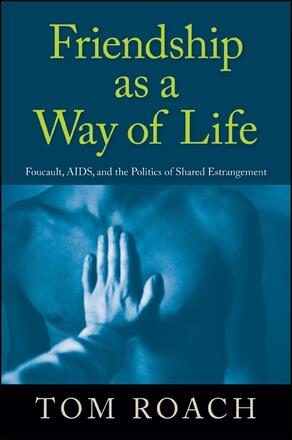
Friendship as a Way of Life
Foucault, AIDS, and the Politics of Shared Estrangement
Alternative formats available from:
Develops Foucault’s late work on friendship into a novel critique of contemporary GLBT political strategy.
Description
Borrowing its title from a 1981 interview of Michel Foucault, Friendship as a Way of Life develops the philosopher's late work on friendship into a novel critique of contemporary GLBT political strategy. Tom Roach brings to life Foucault's scant but suggestive writings on friendship (some translated here for the first time), emphasizing their ethical implications and advancing a new and politically viable concept—friendship as shared estrangement. In exploring the potential of this model for understanding not only social movements such as ACT UP and the AIDS buddy system, but the literary and artistic work of Hervé Guibert and David Wojnarowicz as well, Roach seeks to reclaim a politics of friendship for queer activism. The first book devoted exclusively to Foucault's work on the subject, it reassesses Foucaultian queer theory in light of the recent publication of the philosopher's final seminars at the Collège de France. Its provocative thesis returns Foucault's concept of biopower to its home in sexuality studies and places queer theory front and center in current biopolitical debates.
Tom Roach is Assistant Professor of Literary and Cultural Studies at Bryant University.
Reviews
"Friendship as a Way of Life is a pulsing and intriguing volume … Tom Roach has done an inspiring job of reminding us how [much] there is to consider within the elliptical references Foucault made to friendship in his lectures and interviews. His reading of the politics and practice of friendship is apt and important. " — Political Media Review
"Finally a book that makes good on Foucault's remarks about the radical possibilities of friendship. By considering in philosophical terms Foucault's relationship with Hervé Guibert, Tom Roach presents an original and profoundly de-idealized account of friendship, in which betrayal is necessary rather than contingent. His theory of 'shared estrangement' makes a vital contribution to a number of hotly contested debates, in queer theory and beyond, concerning intimacy, community, impersonality, and biopolitics. Friendship as a Way of Life is such a pleasure to read—so lucid, smart, and compelling—that I wish I'd written it myself. " — Tim Dean, Professor of English and Comparative Literature, SUNY Buffalo
"Tom Roach rightly places friendship at the center of Foucault's attempts to imagine alternatives to sexual identity and to the disciplinary strategies that would constrain us within the confines of sexual identity. Roach masterfully demonstrates how friendship grounds a potentially new communal politics in a private relation; it allows for a move to a radical politics from what Roach speaks of as the impersonal ethic inherent in friendship. This is an important and original contribution to contemporary cultural studies. " — Leo Bersani, author of Is the Rectum a Grave? and Other Essays
["Tom Roach offers us a sustained, rigorous, and sensitive reading of Hervé Guibert and Michel Foucault on the aesthetics of friendship—an aesthetics that in Roach's persuasive argument bespeaks a sociality radically other than the 'society' that afflicts and governs us today, but that nevertheless flourishes in the interstices of our affliction. We need to hear this in our contemporary culture of political despair as much as we did twenty years ago in the early years of the AIDS pandemic. This is a timely and important reminder of the most serious stakes of gay politics. " — William Haver, author of The Body of This Death: Historicity and Sociality in the Time of AIDS]